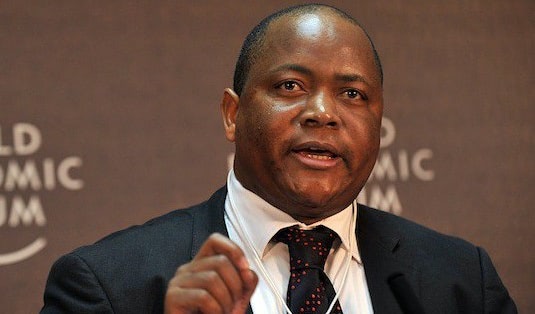Fidelio asked Kuseni to address three broad themes:
- the key drivers of investment in Africa,
- governance trends
- and the challenges to growth including human capital.
Recognising that investment is a precursor of growth, Kuseni opened by acknowledging that investor interest in Africa had been considerable in recent years. McKinsey, for example, highlighted the rise of the African consumer in 2012.[1]
While Africa fulfils many of the preconditions exist for growth, Kuseni highlighted three obstacles that had dampened investors’ enthusiasm.
1. The scourge of Ebola
The first is Ebola which has had such a terrible toll on lives. Although it has been concentrated in Guinea, Sierra Leone, and Liberia, which are a good distance, for example, from South Africa, there is, nonetheless, a tendency by investors to look at Africa as a whole.
2. Radical Islam
Secondly, without a doubt, the very negative media coverage of Islamic State and terrorism has impacted upon investor appetite in Africa. This echoes Fidelio’s previous Board breakfast with Tara O’Connor, who also explored terrorism as a risk to investing in Africa.[2] Her conclusion was that what looks like a concerted pan-African threat is very often closely intertwined with local disputes. Whatever the cause, international investors have been spooked.
3. Human capital bottle necks
Thirdly, Kuseni raised the topic of human capital. He flagged a significant shortage of skills across Africa for industries of the future. This is true from entry level in the workplace, to senior executives, and across a range of sectors. This is likely to become more of an issue as, for example, there is a move from heavy extractive industries towards digital development. It’s also a topic that has recently been flagged as an impediment to growth by the Financial Times.[3]
Expanding on the theme, Kuseni emphasised the importance of experience and good governance skills at Board level and identified the role of Chair of Audit Committee as being critically important, but often challenging to fill. Our guests included Chairmen of UK companies who echoed Kuseni’s focus and concerns about identifying robust and effective Chairs of the Audit Committee.
Institutional support
In the course of the breakfast, we also touched on a number of macro-economic and structural factors. The themes raised in our previous breakfast: ‘Leadership and Africa’ were reiterated.[4] Kuseni referred to the very positive democratic trend across Africa but added how important it was for institutions to become established so that investors and the electorate were not dependent on the integrity of the individual leader, but could rely upon the robustness of parliament and the judiciary. Within South Africa, he referred to the independence of the press as a good example of an institution which has become established and provides challenge to political and business leaders alike.
Sectoral perspectives
Our speakers around the table brought very different sectoral experience, and we looked, for example, at the model of the South African car industry which now produces a surplus of cars for the domestic market, and has become a template for an effective export industry. It is also is a sector which enjoys stronger employer/ employee relations than other industries which have recently have attracted considerable media coverage.
The rise in anti-business sentiment
The relationship between business and government was discussed. We highlighted the strong anti-business sentiment pervading Europe. Kuseni argued that this sentiment is even stronger in Africa, and that business could very easily become the punch bag for politicians. Countering this threat, he acknowledged that, privately, many politicians did have a good understanding of business, and recognised the importance of investment. Kuseni also emphasised the importance of business engagement with government. Based on experience with business across Africa, Kuseni also stressed the importance of local employment, rather than imposition of both culture and employees from other African countries.
And this brought us full circle; Kuseni emphasised the important role of business as a driver of growth. Business leaders have a critical role to play which extends beyond a short term profit focus. This is, after all, entirely consistent with what we see in the UK, with the regulatory and political focus on the tone from the top which starts with the Chairman.
Kuseni Dlamini
Kuseni Dlamini is the Chairman of the board of Massmart Holdings – a JSE listed company that is 51% owned by Walmart with a market cap of c. USD2.6bn. He also heads his own investment firm, KDI Holdings. Kuseni is the former Chairman of Times Media Group and has held senior positions (based in South Africa and the UK) in Old Mutual, Anglo American, Richards Bay Coal Terminal Company, Anglo Gold Ashanti and De Beers. Kuseni is a graduate of the Universities of KwaZulu-Natal, Durban and Oxford, where he was a Rhodes Scholar. In March 2008, he was named a ‘Young Global Leader’ by the World Economic Forum (WEF), and was subsequently appointed to a number of WEF initiatives. He is active in professional bodies and charities which include the South African Institute of International Affairs (SAIIA) and Common Purpose and the Advisory Board of Wits Business School. He is also a member of the Council of the University of Pretoria and the former Chairman of the Board of South African National Parks (SANParks).
[1] Mckinsey, The rise of the African consumer, October 2012
[2] Fidelio Overture, The Promise of Africa, April 2015
[3] Financial Times, Young founders are excluded from a booming economy, 17 July 2015

